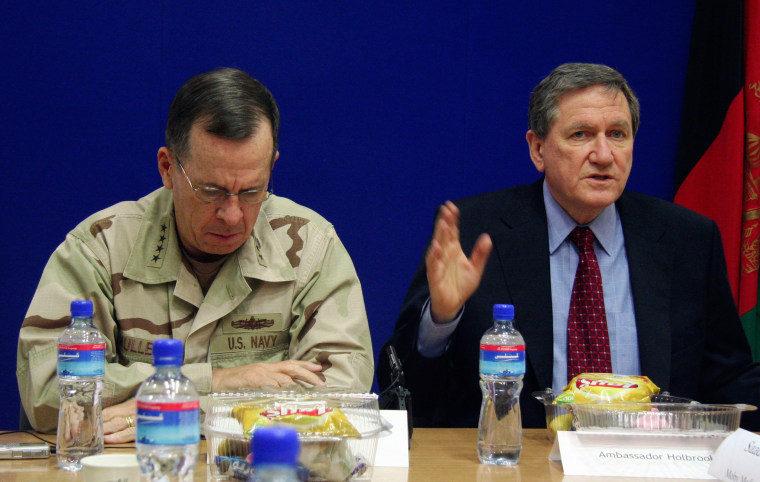Two U.S. envoys trying to reassure Afghan leaders about the Obama administration's new war strategy on Monday heard a former Taliban mullah offer stark warnings on prospects for defeating the Taliban on the battlefield.
"No problem in Afghanistan can be solved by fighting," the mullah, speaking through an interpreter, told veteran diplomat Richard Holbrooke and Adm. Mike Mullen, chairman of the Joint Chiefs of Staff, during their fact-finding tour.
Urging the Afghan government to grant a general amnesty for all insurgents, the mullah warned: "Don't tell the Taliban to lay down their weapons or to surrender. They will never do that."
Holbrooke and Mullen heard a mix of approval and concern about the new American war strategy as they held a daylong series of talks with Afghan government, civic, religious and tribal leaders. Holbrooke said the purpose of the tour was to communicate to Afghans what the new approach is about, as well as soliciting their advice and opinions.
Reporters traveling with Holbrooke and Mullen were allowed to observe their meetings on condition that the Afghan participants not be identified in order to protect them from Taliban retribution.
The U.S. backs reconciliation efforts led by the Afghan government of Hamid Karzai, but it has not favored accommodating the most senior Taliban leaders such as supreme leader Mullah Mohammad Omar, believed to be holed up in the Pakistani city of Quetta.
New diplomatic focus
With insurgent violence on the rise, Mullen and Holbrooke sought to reassure Afghans at every stop that the Obama administration is putting new diplomatic energy and focus, as well as more troops and money, into the war effort.
The response from the Afghans appeared generally positive, although some were outspoken in their suspicions of the U.S. military's new tack.
In his opening remarks to Holbrooke, the most senior mullah on the Ulema Council — the highest religious authority in Afghanistan — said that Afghans are pleased that the U.S. has adopted a new war strategy. And he said the religious leaders have resisted demands by the Taliban to issue decrees against the Americans, whom the Taliban view as occupiers.
"Our answer to them was that the Russians were invaders and occupiers," the mullah said, referring to the Soviet invasion of Afghanistan in 1979, which led to years of occupation that ended after U.S.-armed resistance forces fought a bloody insurgency. "The U.S. and NATO are here to help us."
The mullah and other Afghans who met with Holbrooke and Mullen were not shy about criticizing the American efforts.
"We also have some complaints against you," the senior mullah said, focusing on the failure to stop the infiltration into Afghanistan from neighboring Pakistan of Taliban and other insurgent elements.
Holbrooke acknowledged the shortcomings, saying he and Mullen intended to make the lack of border security a major topic of discussion when they met with Pakistani officials in Islamabad on Tuesday.
The Americans also heard repeated criticism of the periodic U.S. attacks that inadvertently kill Afghan civilians. They expressed regret at the loss of innocent live and pledged to redouble efforts to minimize the mistakes, which they also described as unavoidable in war.
Mullen and Holbrooke also met privately with senior American commanders, including Gen. David McKiernan, the top commander of U.S. and NATO forces in Afghanistan, and Maj. Gen. Richard Formica, in charge of training Afghan soldiers and police.
Allies in stalemate
McKiernan has disputed characterizations of the war as failing, although he has said the U.S. and NATO are stalemated in southern Afghanistan, where the insurgency is strongest. Many of the additional 21,000 troops that Obama has ordered to Afghanistan, beginning this month, will go to the south in what McKiernan said he expects to be a formula for better results in that area.
Over Holbrooke and Mullen's long sessions in Kabul with Afghan farmers, civic leaders, business executives and trial elders — who included a man claiming to be a former Guantanamo Bay prisoner of the U.S. — the emissaries also stressed that Washington views the planned August presidential election as a key moment in setting a firmer foundation for political and social stability in Afghanistan.
Holbrooke, the special envoy for Afghanistan and Pakistan, said repeatedly that the U.S. will neither support nor oppose any presidential candidate — including the incumbent, Karzai.
"I emphasize that," he told the mullahs, "because nobody believes that. But it's true."
But that did little to relieve one frustrated tribal elder who complained that ordinary Afghans have been saddened by the failures of the Afghan government more than seven years after the fall of the radical Taliban regime.
"Our hearts have been broken," the elder said.
